The Best Barbells For CrossFit, Weightlifting, Powerlifting, Deadlifts, and More
Posted by admin on
Out of all the pieces of equipment you can find in a gym, you’ll be hard-pressed to find a more versatile tool than the barbell for building strength. Barbells are great tools for any fitness level and can be used for practically any form of lifting. If you’ve landed on this list, then you’re probably interested in taking your training to the next level by investing in the perfect barbell for your home gym and lifting style.
Similar to any other big gym equipment purchases, buying a barbell should be handled with care and attention. There are many different types of barbells on the market, which can make it even harder to find the best fit for your lifting needs. Our list of the best barbells aims to demystify some of the confusion that can come along with buying a new barbell so that you can focus on lifting heavy and often.
Best Barbells
- Best Barbell All-Around: X Training Elite Competition Barbell
- Best Barbell (Runner-Up): Force USA Gunner BarBell
- Best Barbell on a Budget: REP Basic Barbell
- Best Barbell for Powerlifting: Rogue Ohio Power Bar
- Best Barbell for CrossFit: Again Faster Team Barbell 2.0
- Best Barbell for Weightlifting: Rogue IWF Olympic Weightlifting Bar
- Best Barbell for Beginners: X Training Elite Competition Barbell
- Best Barbell for Squats: Rogue Ohio Power Bar
- Best Barbell for Deadlifts: Rogue Deadlift Bar
- Best Barbell for Women: The Bella Bar 2.0 (E-Coat)
- Best Trap Bar: Rogue TB-2 Trap Bar
- Best Barbell on Amazon: Synergee Games Cerakote Barbell
- Best Standard Barbell: Sporzon! Standard Weightlifting Barbell
Best Barbell All-Around
A barbell is a big investment. It allows you to load weight onto your body, which means a reliable barbell needs to be durable and thoughtfully designed. X Training offers the Elite Competition Barbell, which we think is a great all-around pick.
X Training Elite Competition Barbell
This bar was designed specifically to be able to handle intense cross-training, weightlifting, and powerlifting. The X Training Elite Competition Barbell has a 215,000 PSI tensile strength — the max is 230,000 PSI, which means you can really stack on the plates here. It’s got a 28mm shaft on the 20kg bar (and a 25mm shaft on the 15kg bar) that features medium, dual knurl marks spaced for weightlifting. In other words, it’s ready to take on whatever you can load it with.
This bar is made with alloy steel and has a black chrome finish. It also has oil-impregnated bronze bushings, which offers a great spin for your Olympic workouts and any HIIT barbell complexes your program throws your way. And with no center knurl and no sharp knurling that may be too harsh during high-rep workouts, this tough barbell won’t be tough on your body. Another huge selling point: This bar comes with a lifetime warranty.
The X Training Elite Competition Barbell has a 215,000 PSI tensile strength, and features medium, dual knurl marks. This bar is made with alloy steel and has a black chrome finish — plus, its oil-impregnated bronze bushings provide a great spin.
Who Should Buy the X Training Elite Competition Barbell
- If you’re looking for a durable bar that’s easy to maintain, this barbell is made of a long-lasting alloy steel, coated in black chrome, and comes with a lifetime warranty.
- This bar has a 215,000 PSI tensile strength, so high-caliber athletes can rest assured that this bar can withstand heavy-hitting workouts.
- Weightlifters who need good spin, medium knurling, and Olympic-spaced marks will love that this barbell comes with all of the above.
Who Shouldn’t Buy the X Training Elite Competition Barbell
- Athletes who prefer a center knurl for squatting might want to look for a bar with different knurl marks.
- If you prefer a sharper knurling, you might want to look for other bars, since this one comes with medium knurling.
This barbell is reliable and useful across the board. Whether you’re just starting out or are a high-level Olympic weightlifter, this bar has just what you need.
Best Barbell (Runner-Up)
For most lifters, a barbell is something you want to buy once and never need to think about again. This means that unless you’re competing at a very high level in a strength sport, a barbell like the Force USA Gunner Barbell is going to be one of the best options on the market. Versatile enough to allow you to dabble in all different lifting arenas, this bar is durable and well-engineered.
Force USA Gunner Barbell
When you’re looking to invest in a barbell, you probably want one that can keep up with you no matter what workout you’re putting it through. The Force USA Gunner will accommodate you no matter what you’re doing. If you’re powerlifting, one of its dual knurling options is built to International Powerlifting Federation (IPF) standards. The other knurling pattern follows International Weightlifting Federation (IWF) standards, so you’ll have both IPF and IWF grip marks to guide your workouts.
This barbell is available in 20kgs, and is made of 235,000 PSI steel, which means it’s built to last. And you can choose between either black zinc or bright zinc sleeves, depending on your preference. Whichever type you choose, you know you’ll get a sleek-looking product with super smooth stainless steel bearings that offer a great spin.
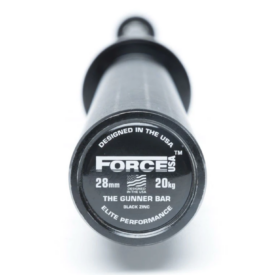
This barbell is available in 20kgs, and is made of 235,000 PSI steel. You can choose between either black zinc or bright zinc sleeves, and either way, this barbell is equipped with smooth stainless steel bearings that offer a great spin.
Who Should Buy the Force USA Gunner Barbell
- Lifters who are looking for a high-quality barbell with a 235,000 PSI tensile strength rating.
- Athletes who like lifting with multiple styles — perhaps those who are chasing the 5-lift super total — will love that this bar has dual knurls for both weightlifting and powerlifting.
- For people who want the option between black zinc or bright zinc sleeves, you’ll find it here.
Who Shouldn’t Buy the Force USA Gunner Barbell
- Athletes who prefer a fully stainless steel barbell will want to look elsewhere.
- Lifters who want a bar that’s dedicated to only either powerlifting or weightlifting might want a less versatile bar.
- If you’re looking for a 10kg or 15kg option, you’ll need to look elsewhere as this barbell only comes in 20kg.
With some smart innovations and excellent build quality, we think this barbell is well worth its price for a product that will last for years and can handle almost any lift you attempt.
Best Barbell on a Budget
Part of us wants to say that you shouldn’t skimp on something you’re going to be loading with heavy weights, but we recognize that not everybody has an unlimited budget, so we found a pick that is both sturdy and budget-friendly. The REP Basic Barbell is designed for beginners, and is ready to take on a solid set of challenges.
REP Basic Barbell
The REP Basic Barbell has a solid construction and comes ready for action. It has a 700-pound weight capacity and 2” sleeve ready to accommodate Olympic-sized plates. It has a 4.75” center knurl to help give the bar that extra grippiness for more security when you’re back squatting. The REP Basic Barbell has a bolted sleeve and zinc coating, complete with a 30mm diameter that can help you get used to barbell mechanics.
This bar is very high quality for what you’re shelling out, but remember that it is a budget bar. So, don’t expect to be able to snatch or clean & jerk with this bar — it’s not designed to accommodate Olympic weightlifting.
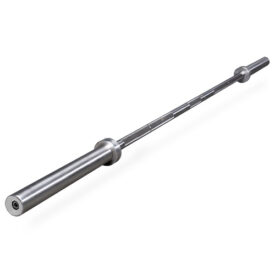
When you’re looking for a high-quality barbell on a budget, the REP Basic Barbell has an attractive zinc coating and a weight capacity of 700 pounds. It won’t accommodate Olympic weightlifting, but its center knurling will help you back squat with security.
Who Should Buy the REP Basic Barbell
- If you’re filling up your home gym on a budget, the REP Basic Barbell’s price point is bound to be attractive.
- Lifters who want a bar with a center knurl for more grippiness during back squats will love that this bar has one.
- Athletes who need a barbell that can accommodate standard Olympic-sized plates will appreciate this bar’s 2” sleeve.
Who Shouldn’t Buy the REP Basic Barbell
- Olympic weightlifters who need a bar that can accommodate snatches and clean & jerks will want to look elsewhere, as this bar isn’t designed for Olympic lifts.
- Athletes who lift heavier than 700 pounds will need a bar with a greater weight capacity.
- Lifters who prefer not to have a center knurl may want to look for a bar that doesn’t have one.
Incredibly affordable, the REP Basic Barbell is top quality and sturdy. So if you don’t need to perform Olympic lifts and don’t need a weight capacity higher than 700 pounds, this budget barbell might be your pick.
Best Barbell for Powerlifting
Powerlifting is a strength sport that revolves around three lifts: the squat, the deadlift, and the bench press, and there are different bars designed for these movements. The Rogue Ohio Power Bar is built to deal with super heavy loading and is stiff as you are likely to encounter.
Rogue Ohio Power Bar
This bar is based on Rogue’s Ohio bar (our overall top pick on this list), but it’s designed to withstand the rigors of competitive powerlifting. The bar is a centimeter thicker than the standard Ohio Bar at 29mm. It has a PSI of 205,000 (compared to 190,000), and features center knurling, which helps the arm stay put during heavy squat sets. Compared to other barbells on this list, the Ohio Power Bar has little to no flex, which means whatever you load onto the barbell will feel true to the actual weight on the bar.
The Rogue Ohio Power Bar is a super stiff and built for heavy loading. A great barbell for powerlifting, the Rogue Ohio Power Bar has "no whip" and aggressive knurling for squats and deadlifts.
Who Should Buy the Rogue Ohio Power Bar
- Lifters who want a barbell that can support a variety of exercises.
- Anyone who wants a bar that comes with a lifetime warranty.
- Folks who don’t want center knurling on their barbell
Who Shouldn’t Buy the Rogue Ohio Power Bar
- Buyers who don’t want to shell out a lot of money (relatively speaking) for a barbell.
- Powerlifters who want a squat-specific barbell.
- Olympic weightlifters or other trainees who need more whip from their bar.
This heavy-duty barbell can be loaded with lots of weight, has centered knurling for squatting, and offers up little to no whip or flex while lifting.
Best Barbell for CrossFit
Bars used in CrossFit have to be able to withstand a lot of banging around. Constantly bouncing between all the different lifting styles, regularly dropping loaded bars from overhead and plenty of chalk to mop up the sweat that will be pouring out, you want a bar that is corrosion-resistant, durable, and not overly specialized with a spin that will last many years. Fortunately, the Again Faster Team Barbell 2.0 has all that and more.
Again Faster Team Barbell 2.0
Does your CrossFit routine involve working on your max squat? Or are you working hard on integrating high-rep snatches into your WOD? Whatever your workout has you doing today, the Again Faster Team Barbell 2.0 will more than likely give you what you need. It comes with both IPF and IWF grip marks, so the knurling of this bar will be able to support you no matter what kinds of lifts find their way into your programming.
Whatever your experience level and needs are, this barbell can meet you there. It’s available in 15kg and 20kg so that you can tackle any CrossFit workout at any level of fitness. Regardless of weight, the Again Faster Team Barbell is constructed from 209,000 PSI steel, and is made to spin thanks to its combination of needle bearings and ball bearings. Plus, it comes with a lifetime warranty, so you can rest assured it will hold up through all your CrossFit training sessions.
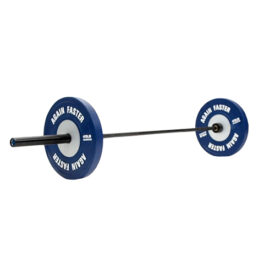
This barbell is available in 15kg and 20kg to accommodate all fitness levels. Regardless of weight, the Again Faster Team Barbell is constructed from 209,000 PSI steel, and is made to spin thanks to its needle bearings and ball bearings.
Who Should Buy the Again Faster Team Barbell
- CrossFitters who need to be able to choose their personal barbell weight will love that this bar comes in 15kg and 20kg.
- Lifters who love CrossFit-style lifting — which can involve lifts from both powerlifting and Olympic weightlifting — will be attracted to the dual knurl grips, designed to both IPF and IWF standards.
- If you’re looking for a bar with great spin, you’ll appreciate the needle bearings and ball bearings here.
Who Shouldn’t Buy the Again Faster Team Barbell
- Lifters who like the look of silver barbells might want to choose an option that doesn’t have a black hard chrome finish.
- Athletes who prefer bars with center knurling might want to find another barbell, because these don’t have a center knurl.
CrossFitters will appreciate the versatility of this barbell, which can accommodate powerlifting and weightlifting, with size choices and bearings that make for great spin.
Best Barbell for Weightlifting
Olympic weightlifting is a sport that is all about timing. Get it right, and the bar’s whip combined with the power from the legs allows for a greater load to be lifted. Rogue has developed a bar that is IWF-approved and serves up everything a weightlifter wants in a barbell.
Rogue IWF Olympic Weightlifting Bar
This 20-kilogram barbell is crafted from both US and EU steel, is certified by the International Weightlifting Federation, and featured bearings (not bushings) in the sleeve of the bar. The bearings mean that there’s more spin in the barbell sleeve, which is crucial for weightlifting as lifters must transition the barbell from the floor to a clean position (and/or overhead). It can also withstand up to 215,000 PSI and comes with a lifetime warranty.
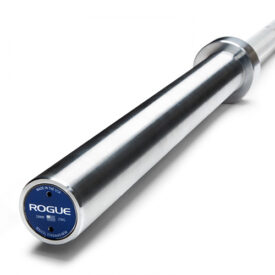
The Rogue 28MM IWF barbell is designed specifically to meet the needs of Olympic weightlifters. Built to spec with the right amount of whip, this barbell is perfect for weightlifters training for the platform.
Who Should Buy the Rogue IWF Olympic Weightlifting Bar
- Olympic weightlifters who need a training bar approved by the IWF.
- Those who want an incredibly strong and resilient bar.
- Buyers who want a bar with a warranty (12 years here).
Who Shouldn’t Buy the Rogue IWF Olympic Weightlifting Bar
- Lifters with a tighter budget.
- Those training for sports other than Olympic weightlifting who need different specifications for their bars.
- Athletes who want a stiffer bar.
If you’re competing in Olympic weightlifting, this is your bar. Get used to the feel of the bars you’ll compete with and head into your next weightlifting meet full of confidence.
Best Barbell for Beginners
The best barbell for beginners needs to accommodate several different styles of lifting, as beginners rarely start out with a particular specialization. Imagine buying a specialized bar for powerlifting, only to find that you love Olympic lifting. The X Training Elite Competition Barbell doesn’t restrict your choices, and is even available in a 15kg women’s size, as well as standard men’s 20kg.
X Training Elite Competition Barbell
When you’re just starting out, it’s unlikely that you’ll know exactly what kind of lifts you’ll like best. You might also be excited to try out different kinds of lifting — so, you’ll want a barbell that can accommodate just that. Thankfully, the X Training Elite bar has just what you need with dual grip options and knurl marks for both powerlifting and weightlifting standards. These marks allow you to get the right hand grip width each time whether you’re grabbing the bar to bench press, do some snatches, or want to try out both.
This is a bar that you won’t have to replace right away once you’ve gained some more experience and start lifting heavier weights. It’s well constructed with a 215,000 PSI alloy steel to make it strong and a black chrome finish to help prevent rust. The bronze bushings help to give the sleeves just the right amount of spin for any type of lifting. This bar is just at home in a commercial gym as it would be in a home gym. It also has a lifetime warranty, so you can feel confident in your purchase.
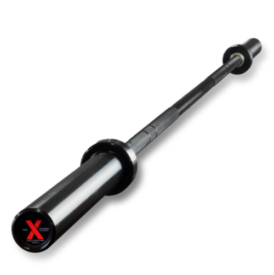
The X Training Elite Competition Barbell has a 215,000 PSI tensile strength, and features medium, dual knurl marks. This bar is made with alloy steel and has a black chrome finish — plus, its oil-impregnated bronze bushings provide a great spin.
Who Should Buy the X Training Elite Competition Barbell
- Beginners who want a bar that they can grow with and won’t have to replace as soon as they start moving heavier weights will like the sturdy 215,000 PSI rating.
- Athletes who are just learning to lift and still figuring out what type of lifting they like to do will love the dual grip knurl mark options to guide your grip for both powerlifting and olympic lifts.
- Those who want a bar with a little more whip. This bar boasts above average whip despite being extremely strong.
Who Shouldn’t Buy the X Training Elite Competition Barbell
- Lifters who prefer a more moderate knurl might find the medium knurling on this bar to be a bit too abrasive.
- More advanced athletes who are specializing in either Olympic lifting or powerlifting might want to opt for a bar that is more specifically designed for their sport.
- If you want a center knurling to secure your back squats even closer, you might want to look for a bar that has one. This bar doesn’t have a center knurl.
The Elite Competition Barbell from X Training is strong, durable, and well-priced. As a beginner, those are all the right things to look for in a barbell. This isn’t a beater bar either that you’ll have to replace after just a year or two — it has a lifetime warranty and is meant to stand up to daily use for years. If you want a bar that can take you from just starting out to more advanced levels, this is it.
Best Barbell for Squats
For heavy squats, stability and grip is key, which is why you want a bar that is sturdy and has center knurling.
Rogue Ohio Power Bar
The Rogue Ohio Power Bar is our pick for those who want a bar dedicated to pushing up those squat numbers. It’s an exceptional choice due to its 205,000 PSI tensile strength, which allows it to handle extremely heavy loads with no issues. There are other bars with great tensile strength, but the lack of whip, aggressive knurling, and a variety of finish options mean that the Ohio Power Bar is an ideal choice for squats and powerlifting in general.
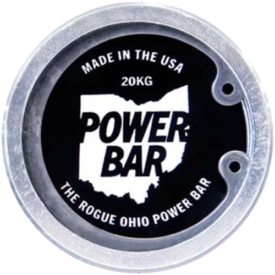
The Rogue Ohio Power Bar is a super stiff and built for heavy loading. A great barbell for powerlifting, the Rogue Ohio Power Bar has "no whip" and aggressive knurling for squats and deadlifts.
Who Should Buy the Rogue Ohio Power Bar
- Lifters who want a super-strong bar for heavy squats.
- Trainees who like a bar with very little whip for stability.
- Athletes who want aggressive knurling for extra grip.
Who Shouldn’t Buy the Rogue Ohio Power Bar
- Buyers who don’t want to pay a premium for an extra-strong bar.
- Those who prefer more gentle knurling.
- Olympic weightlifters or other trainees who need more whip from their bar.
Super stiff for stability, when you hit the bottom of the squat with circa max weight, you’ll be glad you chose the Rogue Ohio Power Bar.
Best Barbell for Deadlifts
There’s a saying in powerlifting: “The meet doesn’t start until the bar hits the floor.” Deadlifts are notoriously hard. If you really want to push up your numbers, it’s worth considering getting a specialized bar like the Rogue Deadlift Bar.
Rogue Deadlift Bar
This bar is slightly thinner in diameter (27mm), slightly longer in length (90.50in), and has a much greater whip than a normal bar. All three of these characteristics mean that there will be a much greater bend (whip) in the bar as the lift is pulled off the floor. With 190,000psi tensile strength, the whip is a design feature and not something to worry about. It will allow for greater speed on the bar when deadlifting.
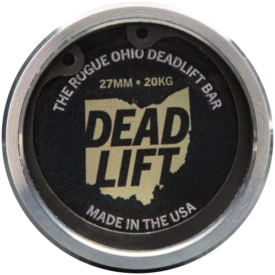
The Rogue Ohio Deadlift barbell has aggressive knurling and great whip for maximizing leverage in deadlifts. If you're primarily deadlifting and pulling from the floor, this bar can't be beat.
Who Should Buy the Rogue Deadlift Bar
- Lifters who want a bar with a good deal of whip for deadlifts.
- Trainees who enjoy a bar with aggressive knurling.
- Athletes who want a smaller diameter bar for grip.
Who Shouldn’t Buy the Rogue Deadlift Bar
- Lifters for whom a stiffer bar would be more appropriate.
- Buyers that don’t want to spend extra money on a specialized bar.
- Powerlifters whose federation of choice doesn’t allow bars with the same whip.
For those who have the money, space, and the inclination to train deadlift with such specificity, the Rogue Deadlift Bar is a worthy choice.
Best Barbell for Women
For women, using a 28mm diameter bar when squatting or bench pressing shouldn’t impact their performance. However, any form of pulling can be much tougher. Hence the need for barbells with a smaller 25mm diameter grip, like the Bella Bar.
The Bella Bar 2.0 (E-Coat)
Aside from being slightly smaller and lighter than a men’s bar, there isn’t any other aspect of this bar dialed back. The Bella Bar still has great tensile strength at 190,000psi, a corrosion-resistant E-coat finish, and a hybrid knurling pattern versatile enough to handle Olympic lifting and Powerlifting.
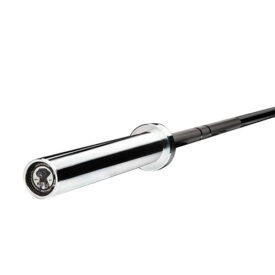
The Bella Bar 2.0 is perfect for women seeking a versatile and durable barbell for their workouts.With a slightly smaller diameter and an E-Coat finish, people with smaller hands should find this bar easier to grip.
Who Should Buy The Bella Bar 2.0 (E-Coat)
- Women who want a bar that comes with a good protective finish that is also environmentally friendly.
- Athletes wanting a bar with a decent amount of whip for lifting.
- Trainees who want a bar with very high tensile strength for a reasonable price.
Who Shouldn’t Buy The Bella Bar 2.0 (E-Coat)
- Women who need a bar with specifications for their sport.
- Buyers looking for a stiffer bar with less whip.
- Lifters wanting a bar with a 28mm diameter.
A strong, whippy bar with a smaller diameter than men’s bars, the Bella Bar 2.0 (E-Coat) is a great option for women looking for a versatile option for their lifts.
Best Trap Bar
Purists may object to a trap bar being on a list of the best barbells. However, they are excellent bars in their own right and can be a great tool in many situations that a regular barbell may not be. They’re accommodating, and they can also be used for more than just deadlifts.
Rogue TB-2 Trap Bar
When you need a trap bar that can handle tough and creative workouts, the Rogue TB-2 Trap Bar may be the option for you. It’s got two sets of parallel handles that you can access by flipping the bar over — you don’t need anything fancy to transform your exercise angles and challenge specific muscle groups differently. Whether you’re a beginner or rehabbing from an injury, the added versatility that comes with the dual handle option can prove especially useful to make sure the bar is serving your needs as specifically as possible.
Both sets of handles are 1.34” in diameter and are knurled to make sure they can support your grip and hold chalk for your toughest of workouts. This empty bar weighs a hefty 60 pounds, so you’re already sure to get your exercises off to a strong start. The Rogue TB-2 Trap Bar comes with an attractive Rogue signature black powder coat, which will give your trap bar that sleek look. This bar may not accommodate all standard barbell collars, since this is a specialty bar — and metal-to-metal contact from adding and removing weight plates might cause some wear and tear on the finish over time.
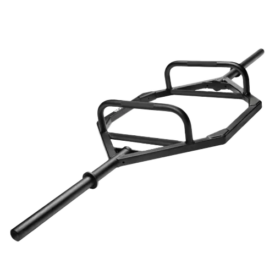
This trap bar features two sets of fully knurled handles for you to workout with. One set of handles are raised, and sit 8.25 inches off the ground, while the other set are level with the frame of the bar to increase your range of motion.
Who Should Buy the Rogue TB-2 Trap Bar
- If you’re rehabbing an injury or looking to modify particular lifts (think: the deadlift or bench press), you’ll love that this trap bar has dual parallel handles for added grip variety.
- Athletes looking to add a new bar for extra variety in their workouts will appreciate the utility of this trap bar.
- Lifters who want their bar to start a little heavier than the typical 20kg (44 pounds) will appreciate that this bar weighs in at a hefty 60 pounds.
Who Shouldn’t Buy the Rogue TB-2 Trap Bar
- Powerlifters or Olympic weightlifters who need a specific barbell for their training may want to prioritize a barbell before investing in a trap bar.
- If you need a bar that can definitely accommodate all standard barbell collars, you may want a less specialized bar.
- Athletes who want a bar with a finish that won’t get worn down from the metal-to-metal contact of adding or removing plates might want to look elsewhere.
Opening up a whole new range of lifts, the Rogue TB-2 Trap Bar is ideal if you want to lift without worrying about tearing up your shins during your deadlift session.
Best Barbell on Amazon
Amazon can be a minefield for purchases, but we were very impressed with the Synergree Games barbell. It sports a set of great features that we’d want to see on similarly priced bars elsewhere, and customer service promises a brand new bar sent to you with no questions asked if you have an issue with your order.
Synergee Games Cerakote Barbell
Above-average tensile strength, a cerakote finish, and 10 needle bearings mean that this bar is great value for money. As if that wasn’t enough, you get a complimentary pair of wrist wraps and lifting straps. It does have typical knurling, which may put powerlifters off, but the price may make up for it.
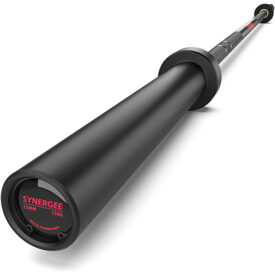
The Synergee Games Cerakote barbell has a medium knurling, whip and has an above average tensile strength. Combine that with 10 needle bearings, and we think this barbell has a lot to offer many types of athletes.
Who Should Buy the Synergee Games Cerakote Barbell
- Lifters who want a versatile bar for multiple disciplines.
- Consumers who like a colorful bar.
- Trainees who want a strong bar with good whip.
Who Shouldn’t Buy the Synergee Games Cerakote Barbell
- Buyers who don’t like bars with a cerakote finish.
- Powerlifters who want a bar with more aggressive knurling.
- Those who need a stiffer bar with less whip.
Eye-catching and accomplished, this bar is not just a pretty face. You can get some serious lifting done, and the option for Amazon Prime shipping is the icing on the cake.
Best Standard Barbell
The difference between Standard and Olympic barbells lies in weight collar diameter. “Standard” size barbells and weights feature one-inch diameter holes, and collars are generally much less common than their Olympic counterparts, which have two-inch collars and plate holes. Rated up to 700 pounds, this Standard barbell from Sporzon! is strong enough for beginners up to pretty advanced lifters. They’re probably not ideal for Olympic weightlifting with no spin on the sleeves, but this could be a welcome addition to home gyms.
Sporzon! Standard Weightlifting Barbell
Different bar diameters and length options from 5 to 7 feet are useful for those who are limited in their workout space, and the chrome finish will be fine for most lifters throughout the life of the bar. Just make sure you give it a clean every few weeks and purchase the correct diameter weight plates to match your bar, and you’ll get some great workouts in.
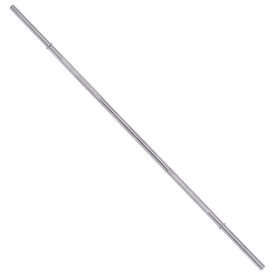
The Sporzon! Standard Weightlifting barbell is a solid option for buyers who need a barbell with 1 inch and 2 inch options, as well as different lengths.
Who Should Buy the Sporzon! Standard Weightlifting Barbell
- Consumers who want different options for the length and diameter of their bar.
- Lifters who want an affordable Standard sizing bar that is tested up to 700 pounds.
- Those who have a smaller space to work out but still need a barbell.
Who Shouldn’t Buy the Sporzon! Standard Weightlifting Barbell
- Buyers who don’t want a chrome-finished barbell.
- Athletes that need a bar with Olympic plate and collar sizing.
- Trainees who prefer a bar with more aggressive knurling.
With multiple different options for grip and length, the Sporzon! Standard Weightlifting Bar is affordable and ideal if you aren’t blessed with huge workout space.
How We Assess Barbells
Testing barbells is a tedious task and it takes ample time to get just right. Here are some of the factors we consider when assessing our favorite barbells.
Task At Hand
The first thing we consider when testing a barbell is to establish what they’re designed to do. For niche barbells, we train with them in the fashion they’re intended to be, then compare what we experience with the notes that the company provides for the barbell. For example, if the company says their bearings rotate well for a weightlifting bar, we test that exclusively with diligence.
Durability
Another major component we consider is the barbell’s durability. We first assess how the barbell holds up over time in our gym, then we look at intricate factors that the company lists about the barbell. These are all the specs that no one considers, but make a huge difference!
Price
The final component we consider in our tests is the price of a barbell. We tie the performance specs into the price to find barbells that walk harmonious lines for those on a budget that want the most for their money.
What to Consider Before Buying a Barbell
Whilst it may come as a surprise that there can be such variance between a cylindrical lump of metal that has a standardized length, there are in fact a host of differences that you should be aware of as you look for a barbell.
Types of Barbells
There are multiple types of barbells on the market, and for the beginning lifter or home gym owner it can be a little daunting when shopping around and seeing all of the options. In respects to major types of barbells, there are basically three that are relevant to recreational lifters and strength athletes, and these are regular (or cross-functional) barbells, weightlifting barbells, and power barbells.
These three barbells will each offer a variety of features to match specific needs. Below, we’ve quickly highlighted some of the main differences in the three most common types of barbells.
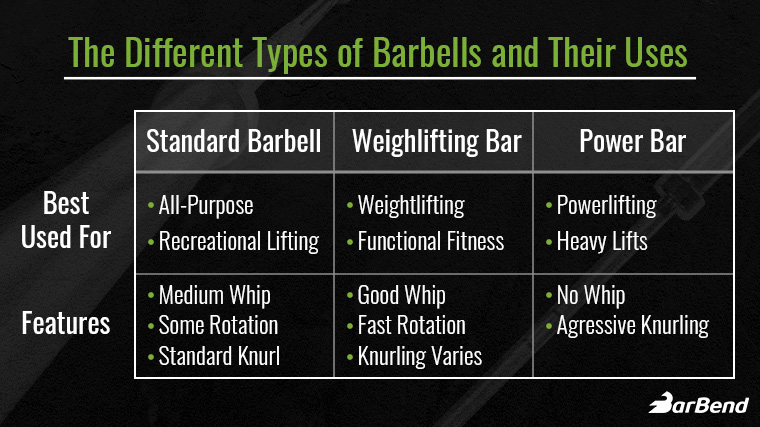
Outside of these three types of barbells, there are also specialty bars that are common in niche strength sports gyms and sports. We’ve listed a few of the major types of bars below, along with their ideal uses.
Women’s Bars
Women’s bars are made with weights of 15kg or 35 lbs and have a diameter of 25mm.
Deadlift Bars
Best for deadlifts, as they offer a lot of whip, aggressive knurling, and a sometimes smaller diameter.
Squat Bars
Best for squats, as they’re typically made with no whip and have center knurling for gripping the back.
Hex Bars
A bar shaped like a hexagon and a useful niche implement for variation and teaching hip hinging.
Knurling
The knurling on a barbell is the etched, sandpaper-like texture that covers each side of the barbell and sometimes the middle. Knurling on a barbell is important for three major reasons. First, it promotes grip and can help improve lifting by allowing the barbell to remain still in the hands. If you try lifting holding the smooth portions of the bar vs the knurled parts, you’ll instantly understand how helpful it is.
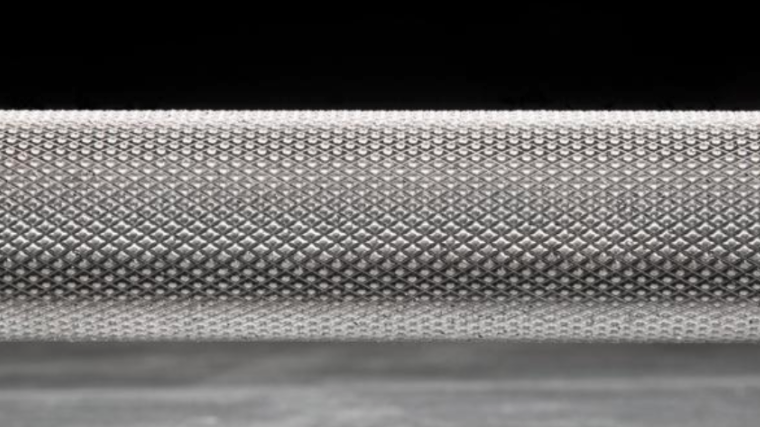
Second, knurling is a useful tool for finding proper positioning on the bar. Each side of the barbell’s knurling will have a ring, sometimes two, and these can be useful for accurately finding hand and body positioning when trying to be centered on a barbell.
Finally, knurling patterns can be specific to certain sports. For example, Olympic bars will have a smooth center knurling to avoid scratching the neck during cleans, whereas deadlift bars will have even more pronounced knurling to promote grip.
Bar Diameter (Grip Diameter)
A barbell’s grip diameter can be an easily overlooked construction attribute that can be very important. The diameter of a barbell can be catered to one’s needs based off of preference, gender, and strength sport. The most common grip diameter for men’s barbells tends to be around 28mm-29mm and women’s are 25mm.
| Common Barbell Grip Diameters | Useful for Whom/What |
| Men’s 28-29mm (Deadlift Bars Average 27mm) | Recreational lifting, powerlifting, weightlifting, CrossFit |
| Women’s 25mm |
Recreational lifting, weightlifting, CrossFit |
If you are a casual lifter, then you’ll want to choose the most common diameter and discover what your preferences might be. However, if you are planning on competing in a strength sport, then you should investigate the diameters that are mandated by your sport’s governing body and only purchase bars that match that. The barbell you use in training shouldn’t differ from those that you’ll use in competitive settings. It is important to note that some specialty barbells can vary from the grip diameters listed above, but we’d recommend considering sticking with what’s most commonly used unless you have a good reason not to.
Strength
Tensile strength, yield strength, and test on a barbell can all be great suggestions for a barbell’s long-term durability and can help highlight the likelihood of the barbell prematurely resisting breaking and fracturing. All, or some of these attributes are listed by most barbell manufacturers, and we’d suggest straying from any company that isn’t willing to readily share their barbell’s details, as that could mean that their bar will be prone to quicker breakdown.
Tensile Strength
Out of the three attributes above, tensile strength is possibly the most important and widely used to highlight barbell strength/durability. This attribute entails how much your barbell can be loaded with before it breaks or fractures. Higher tensile strength generally means a better, higher-quality barbell.
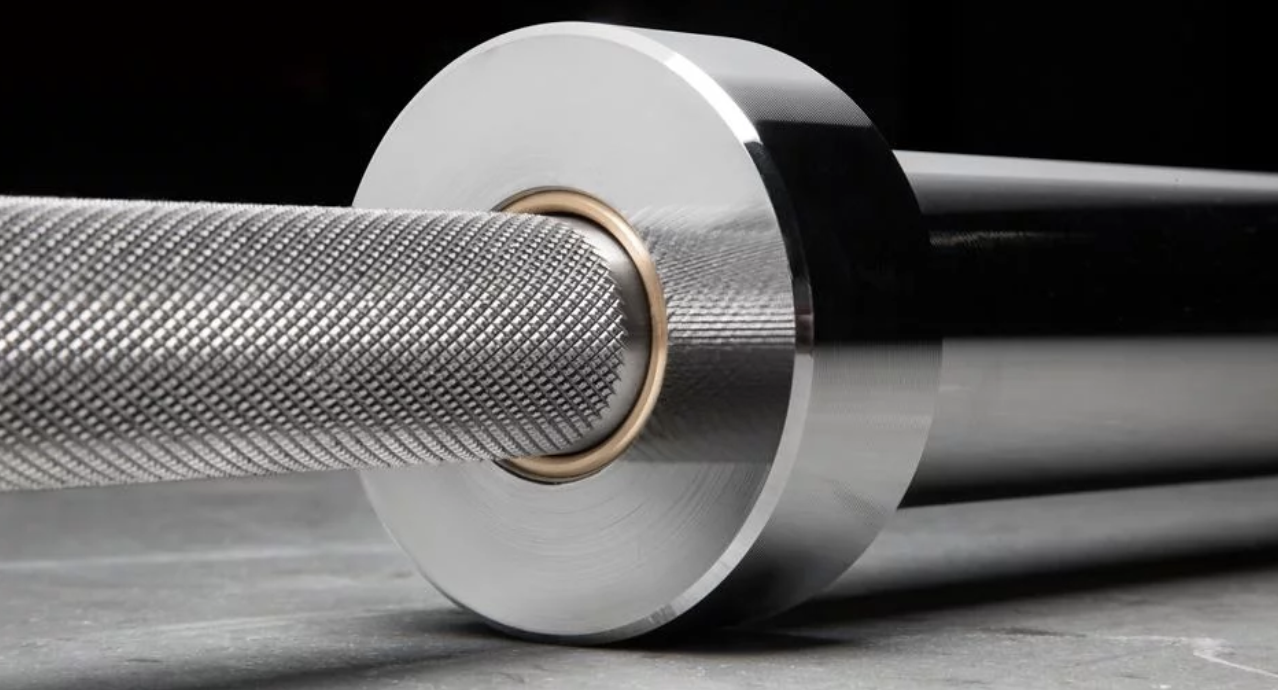
Below, we’ve highlighted some general tensile strength guidelines.
150,000 PSI > — Decent for beginners, but it might be worth spending a bit extra to make your investment last.
150,000-180,000 PSI — Good and suitable for most athletes.
180,000+ PSI — High-quality, well-constructed barbell that should last a long amount of time.
Yield Strength
This construction attribute entails how much weight can be loaded on a barbell before it becomes deformed. Have you ever lifted on a barbell that is shaped like a noodle? That is exactly what failed yield strength looks/feels like. A lot of companies don’t list their yield strength, but that’s not the biggest deal. This attribute can often be prevented by simply using good barbell practices (ex: not dropping a barbell on safeties with weight, etc), and high tensile strength often correlates with high yield strength.
Test
This construction attribute entails the documentation of how much weight a company has used to physically test the barbell. Some companies list the test of their barbells, and some don’t. If a company doesn’t list their barbell’s test, then make sure you look at tensile strength as these two can be closely related.
Whip
The whip of a barbell is the final (but very important) construction aspect to factor into your buying decision. Whip entails how much the bar will flex and give without losing its original shape. For the recreational and beginner lifter, this isn’t a huge concern, but it can become more important as athletes get deeper into their lifting careers and start competing.
Some companies will list how much whip their bars have, and most likely, these bars will have a specific purpose like weightlifting, deadlifting, squatting, and so forth. Below, we’ve included some general recommendations for different athletes considering a bar with whip.
Beginner or Recreational Lifters
Standard whip is fine and won’t impact your movement much.
Weightlifters
A bar with whip is useful for training, as this will closely resemble what’s used in competition.
Powerlifters
Check out your federation’s rules. Deadlift-specific bars will have a lot of whip, which is great for pulling, but problematic in other movements. Power bars will be much stiffer and are used in federations like the USAPL.
Warranty
Newly bought barbells will almost certainly come with some form of warranty. If you buy second-hand, this warranty will usually then be voided even if you are still within the warranty period, so this may factor into your decision of what to purchase.
Standard warranties typically cover manufacturers’ defects and design issues for a year to two years,. However, this can vary. Finally, note that the warranty will also be voided if you are negligent. Leaving your bar out in the rain for example, or on a squat rack loaded up with plates is a sure-fire way to lose coverage.
Raw Materials and Finish
Bars are almost always going to be made from steel, however, as we mentioned earlier the quality of steel can vary and this is what leads to different tensile strengths for different bars. Other important materials to look for are the bearings or bushings and the finish.
Bars with bushings are generally used for slower lifts, mainly within powerlifting and bronze is going to be the best all-round option. Bearings give much better spin of the sleeves and so are generally used for Olympic lifting. Needle bearings are the gold standard here.
Generally, for the finishes, stainless steel and cerakote are going to be the most expensive, but also the most resistant to wear and tear. At the opposite end of the spectrum, bare steel, budget chrome and black oxide are going to be cheaper but also less resilient.
If after reading through all this, you still need help deciding which bar works best for you, we have a handy guide that goes into greater detail.
Caring for your Barbell
To keep your barbell in tip-top condition you’ll need to do 3 things semi-regularly:
- Clean the chalk and any other mess off the bar and the knurling using a brush
- Wipe down the bar with a gentle cleaner and then give it a light coat of oil. Leave this overnight to sink in.
- Check the sleeve to see if the bearings are in good condition. Some bearings will need oil, others won’t. You’ll need to check with your manufacturer whether your bar is the former or the latter.
How often you have to do these steps will depend on the metal used to make the bar, the climate you live in, and how often the bar is used. Cheaper bars made out of budget chrome or zinc will need checking regularly, every 2 to 4 weeks. Stainless steel and other more expensive options will need less frequent checks, usually only every month to 3 months. More humid climates will need more care to prevent rust, where a dry climate will mean bars last longer naturally. Finally, a bar that gets heavy usage will need more maintenance than a bar that you have personally in your garage and only use twice a week.
Trap Bars vs Conventional Bars
On the surface, this seems like an easy choice in favor of conventional bars. When you’re deciding between a trap bar and a conventional barbell, the choice really comes down to this: are you training for a sport that uses the barbell? If the answer to this question is yes, then you should buy a conventional bar. If the answer is no, then the choice between a trap bar and a conventional bar becomes one of personal preference.
Some people prefer trap bar movements because of their simplicity. Others prefer barbell movements because of their tried and tested results. If you look closely at functionality, trap bars can deliver a lot of the same benefits as conventional bars. In an ideal world, we would tell everyone to use both, but we know that’s not realistic. Just know that if you aren’t competing in a barbell-based sport, you can’t make a wrong choice here.
Barbells vs Dumbbells
Another really contentious debate is whether to get a barbell or a set of dumbbells. In many cases, the cost for these two items is similar, so which should you go for if you can only choose one?
If you’re training for powerlifting or weightlifting, then a barbell is an essential tool, as it’s the primary implement for the required movements. But if you’re more into functional fitness or like to work in isometric training into your routine, then dumbbells may be a really good fit for you. While barbells are incredibly versatile, dumbbells might take the cake when it comes to ultimate versatility. That being said, if you’re not looking to buy a whole set of dumbbells, there are many quality adjustable dumbbells on the market to suit a variety of needs.
Final Word
The barbell is an incredibly versatile tool that can help you get strong, flexible, and explosive. Prices can vary hugely, as can the quality and the features, so make sure you’re clear on what you need before you buy. You can end up spending a fair chunk of cash on something that you won’t use otherwise.
Once you have your bar, take good care of it and make sure you take equally good, if not better care, of your body by lifting with good technique and making sure to follow an effective training plan. If you do these things, you may never need to buy another barbell, and you might end up achieving some great training gains as well.
FAQs
What makes a great barbell?
A quality barbell will come with some form of warranty and a full rundown of performance specs. Some companies leave out key details that provide insight into how long their bar will likely last, so always be mindful of things like tensile strength, whip, shaft material, and so forth.
What does a barbell's tensile strength mean?
Tensile strength for a barbell entails how much your barbell can be loaded with before it breaks or fractures, aka high tensile strength = better barbell.
Does whip matter in a barbell?
Yes! Whip is an important component to consider for athletes and lifters that are training heavy and have specific strength sport focuses.
The post The Best Barbells For CrossFit, Weightlifting, Powerlifting, Deadlifts, and More appeared first on BarBend.
